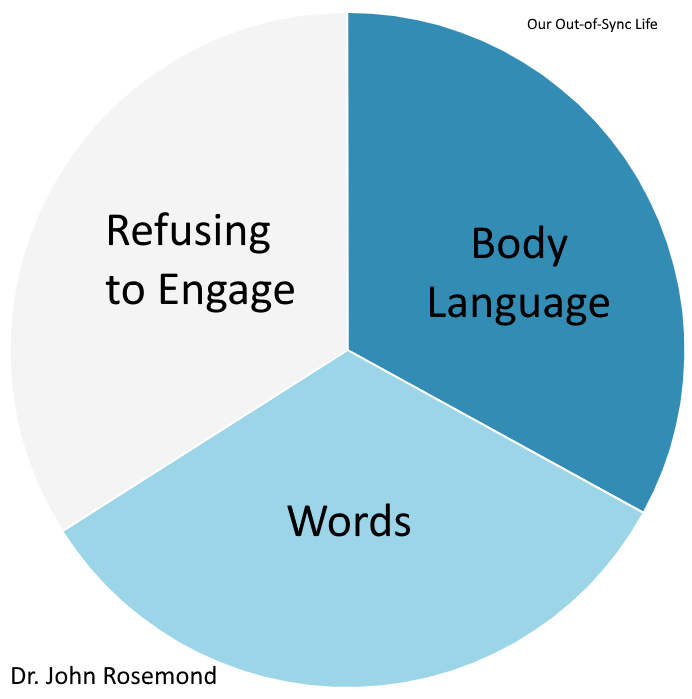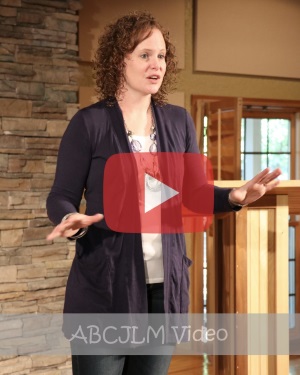A while back I read this quote in the newspaper from Dr. John Rosemand.
The key to effective discipline is a proper parental attitude.
Breaking it down, it’s one-third proper body language…, one-third proper speech…, and one-third refusing to engage in nonproductive back-and-forth (arguments).
It sounds so simplistic, but do you know how to put this into action?

Let’s try using ABCJesusLovesMe parenting language to explain.
1/3 Body Language
Does your child know that you are in charge? When you tell a child to do something, demonstrate a body language and attitude that shows the child you expect follow through. And, if the child chooses not to obey, consequences will happen.
If you don’t think this is important to your child, watch your child’s reaction in an unsettling situation where an adult is not taking authority. My teenager has said multiple times that he struggles with anxiety when he can tell that an adult can’t handle a situation.
Also, children will only reach as high as you set the bar. If you assume that a child won’t listen or is unable to complete a task, the child will fulfill your expectations.
For example, let’s say that you take your child to a library for reading time. Quality librarians have the expectation that children can sit for an age-appropriate time. Many parents are shocked that their child will sit for the librarian but refuses to sit at dinner time. It centers around the body language and the expectations that it projects.
One more thought. Everything we do should be done in love, our body language should never be threatening or overbearing. Instead, speak to your children with confidence that you have their best interest in mind.

1/3 Proper Speech
The wording that we chose when talking to our children is crucial. I believe there are three parts to this.
Statements, Not Questions
Instead of phrasing a request as a question, state your desire in a sentence. Asking or ending the statement with “Okay?” also opens up the expectation for debate.
“Will you pick up your toys?” vs “Pick up your toys please.”
Use Less Words
Ecclesiastes 6:11 asks, “The more the words, the less the meaning, and how does that profit anyone?” After a few sentences, children check out of a conversation making it very important to choose your initial words wisely.
I have found the use of one-liners to be crucial to parenting success. By having them in mind for immediate use, I don’t fall into the lecture trap.
Here are some of my favorites.
- Uh-oh
- Bummer, what are you going to do about that?
- Aren’t you glad that I don’t believe that?
- I am happy to talk with children who are respectful.
Say What You Mean
When you tell your child to do something, does the child know that you mean it? Or, are your words empty? When your speak without follow through, your words mean nothing. This results in a child ignoring what he is told to do.

1/3 Walk Away
I am raising a lawyer. Little Man could argue with an adult and have them confused about the color of a stop sign. His ability with words is truly amazing. If channeled correctly, it will be a wonderful asset. But right now, he looks at every conversation as an opportunity to debate. The best thing that I can do for him is not engage.
Sometimes that means walking away from the battle he is trying to create. Other times I use the one-liner “I love you too much to argue.” This allows both he and I to win and not enter unproductive arguments.

The Key to Effective Discipline
Dr. Rosemond says, “The key to effective discipline is a proper parental attitude.” Want to be an effective parent or teacher?
Check your body language. Is it demonstrating to the child that you can handle any situation that is thrown your way (even if you doubt yourself)?
Check your words. Are you providing the child an opportunity to object to your requests? Are you talking too much? Have your words lost meaning?
Check your response. Do you allow a child to engage in a battle?
If you have children, you are a parent. The question is, are you an effective parent?
If you are unsure, I encourage you to ask your spouse or a close friend. If they are honest, they will be able to help you process through each of these points.
If you aren’t on the right path, I invite you to view the 3-part series of Biblical Parenting and Teaching! You will discover what God says about raising and teaching children and then create a toolbox of ideas to teach children to love God and love others.

